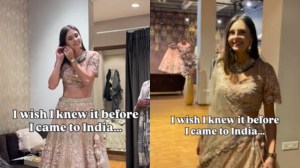Peace common desire in India, says Vajpayee
Prime Minister Atal Behari Vajpayee has said the entire spectrum of mainstream political opinion in India is for peace, cooperation and frie...

Prime Minister Atal Behari Vajpayee has said the entire spectrum of mainstream political opinion in India is for peace, cooperation and friendship with Pakistan.
In an exclusive interview with Dawn at his residence here on Thursday, the PM made it clear that not only his Cabinet and the top leadership of his party, but also the mainstream political opinion was for making peace with Pakistan. ‘‘The main question that is raised by critics of my peace initiative is whether it is getting — and will get in the future — a matching and sustained response from Pakistan,’’ he added.
If such a response was forthcoming, ‘‘I can see no obstacle to establishment of a climate of friendship and cordiality in which we can discuss and resolve all our outstanding bilateral issues, including Jammu and Kashmir’’.
Four factors were forcing Pakistan and India towards peace, he said. ‘‘First and foremost, popular sentiments are overwhelmingly positive. Second, the imperative of globalisation dictates closer cooperation for faster economic development. Third, in the post-cold war world, it is in our national interest to join hands in tackling the many common problems we face in our countries and with the outside world. And finally, for how long do we want the world to look at India-Pakistan relations either as a threat to global peace or as a promising laboratory for new experiments in conflict resolution?’’
Vajpayee said it was the tragic experience of the two countries which generated the feeling that efforts for peace and cooperation could not last. ‘‘We have to draw sober conclusions from the lessons of our history,’’ he said. When suggested that one hoped his third effort for peace between the two countries would bear fruit, Vajpayee reiterated: ‘‘This is my last attempt.’’
He implied that he would not have the time to make a fourth attempt, referring perhaps to his age — he turned 79 last month. He virtually rejected Musharraf’s four-step plan for resolving the Kashmir issue by referring to the Shimla agreement, which, he said, clearly provided for the two countries to have bilateral dialogue for a ‘‘settlement’’ in J-K. ‘‘In spite of our clear position on the status of J-K, India has never shied away from a dialogue on the subject,’’ he added.
What India had been saying all along, he said, was that the two countries should first establish political, economic, cultural and social relations, so that ‘‘we could approach our bilateral differences with a spirit of accommodation and compromise, rather than one of unremitting hostility’’. He hastened to add it did not mean brushing aside J-K and other bilateral issues. ‘‘They will remain on the agenda. If we can discuss them with friendship and understanding — rather than suspicion and hostility — we are likely to find acceptable solutions much earlier.’’
Vajpayee said the Agra summit failed because Pakistan kept insisting on the centrality of the Kashmir issue and ‘‘we could not accept that’’.
When asked about the agreed draft which Pakistanis believed was sabotaged by some elements in his Cabinet, the PM said the draft was written by the two foreign ministers, but it had not had the governmental approval and, therefore, it was not the final draft.
Vajpayee said the fence along the LoC was being erected as an operational requirement to stop cross-border infiltration. ‘‘There was no question of India trying to settle the issue of J-K by building a fence along the LoC,’’ he said.
It was suggested to Vajpayee that in Pakistan the construction of the fence along the LoC was being perceived as an attempt by India to settle the Kashmir issue unilaterally as Islamabad believed that a fence was built only along recognised international borders and not along lines of control in a disputed territory.
‘‘As you know, India does not recognise the LoC as an international boundary. As its name implies, it is the line up to which our two countries exercise actual control on our respective sides. It was delineated by a bilateral agreement in December 1972,’’ he added.
In reply to a question on India’s consistent refusal to allow a formal discussion on bilateral issues during the SAARC summit, he said, one should heed the experience of successful multilateral and regional groupings around the world. ‘‘Whenever a regional organisation is formed, it is to exploit the synergies and complimentary strengths of its member states. This can create a collective entity more effective than the sum of its individual companies,’’ he said.
On the other hand, he maintained, if the organisation were to squander its energies in trying to deal with bilateral problems of its members, it would simply dilute its collective strength.
‘‘Successful regional groups like the European Union and ASEAN have wisely followed the dictum that you should focus on issues that unite, rather than let bilateral differences dominate your agenda. This is the wisdom enshrined in the SAARC Charter, and I think it is fundamental to SAARC’s successful functioning.” —( Dawn)
- 01
- 02
- 03
- 04
- 05































